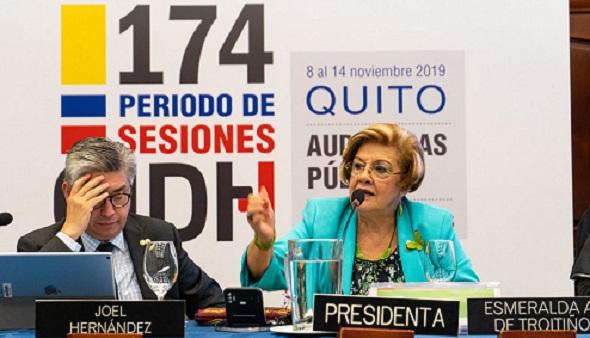
The Inter-American system commits to see the end of the death penalty
Advocacy
Promoting adherence to the American regional protocol on the abolition of the death penalty
The IAHRS Forum focused on the 60th anniversary of the Inter-American Commission on Human Rights and on the 40th anniversary of the Inter-American Court of Human Rights.
On 7 November, the World Coalition organised a panel on the 30th anniversary of the American Protocol on the abolition of the death penalty. Of the 35 member states of the OAS, 13 have ratified the American Protocol, 8 abolitionist countries in law have not ratified it (Bolivia, Canada, Colombia, El Salvador, Guatemala, Haiti, Peru and Suriname,) and 14 still retain the death penalty. Speaking for the World Coalition, President Kevin Miguel Rivera Medina explained the death penalty situation worldwide, the Americas, success stories and regional challenges. Commissioner Joel Hernández García called on the IACHR and the World Coalition to increase collaboration and highlighted the importance of engaging the 8 non-adhered abolitionist countries.
Reinforcing precautionary measures to prevent executions
In recent years, the Inter-American Court of Human Rights has made several decisions on death penalty cases, including with precautionary measures to prevent executions, as in the USA. While assessing the historical impact of the inter-American human rights system and the challenges for the future, Commissioner Joel Hernández García pointed out that some precautionary measures have never been implemented. In the USA, the duality of jurisdictions (Federal and State) are real challenges for the Inter American Human Rights System.
Several ideas were suggested to improve that situation: increase the work between local civil society and the Inter American System, prioritize on emblematic situations to be more effective, improve Media coverage, create guidelines on how to comply with recommendations and decisions, develop social media, have a periodic and systemic way of monitoring corrective measures at different levels: executive, judiciary, legislation.
Challenging the Status-quo in the English-speaking Caribbean countries
On 12 November 2019, at the 174th Period of Sessions of the Inter-American Commission on Human Rights (IACHR) held in Quito, Ecuador, the Death Penalty Project, a member organisation of the World Coalition, appeared before the Commission at a thematic hearing on ‘The situation of the death penalty in the English-speaking countries of the Caribbean’. The delegation consisted of Co-Executive Director, Saul Lehrfreund, alongside Jamaican attorney Malene Alleyne and Kacey Mordecai: attorney and program officer at Robert F Kennedy Human Rights.
The death penalty is currently retained by approximately one-third of the OAS Member States, and of the 14 retentionist States, 12 of them are within the English-speaking Caribbean. Yet none of these have executed in over a decade – most for much longer – and the US is the only actively executing country within the OAS.
At present, the English-speaking Caribbean has a death row population of at least 69 persons – namely in Barbados (10), Grenada (1), Guyana (15), St Vincent and the Grenadines (1) and Trinidad and Tobago (42).
Only four English-speaking Caribbean countries (Barbados, Dominica, Grenada, and Jamaica) have ratified the American Convention. Both Barbados and Dominica have made specific reservations to the American Convention with respect to their use of capital punishment, and Trinidad and Tobago denounced the American Convention in 1998 in order to continue to impose capital punishment in line with the laws of the country.
In a press release following the session, the IACHR asked those OAS member states that retain the death penalty to take proactive steps to move towards abolition: “The IACHR was particularly concerned about the information it heard regarding the death penalty in countries in the Anglophone Caribbean. While these countries have not enforced the death penalty for more than 10 years, challenges remain to abolish this form of punishment (…) The IACHR urges the States who still apply the death penalty to either abolish it or at least impose a moratorium on its application.”
According to the Death Penalty Project, “In this context and given the de facto abolitionist status of all English-speaking Caribbean countries, there is a clear lack of momentum across the region towards complete abolition. This passivity is not necessarily reflective of any significant opposition to abolition, but rather demonstrates a reluctance to question the status quo. With no executions having taken place for over a decade across the region, and over two decades in many of these states, it seems clear that given the necessary impetus, meaningful steps could be taken towards the complete abolition of capital punishment in the English-Speaking Caribbean.
The full hearing is available to view online at: https://www.youtube.com/watch?time_continue=1011&v=c9NECHBXCmA&feature=emb_title



